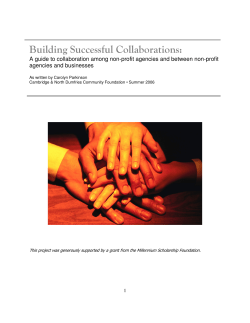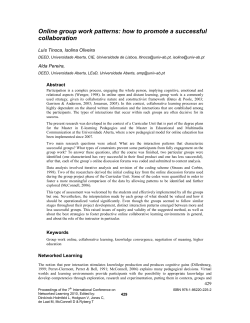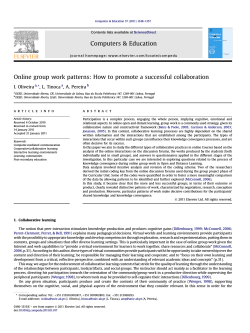
Children with Special Needs ” “Standards and Guidance for Promoting Collaborative
“Standards and Guidance for Promoting Collaborative Working to Support Children with Special Needs” PILOT PROJECT April 2006 FOREWORD We take great pleasure in commending to you this valuable guidance on the Promotion of Collaborative Working between Health and Education Professionals supporting Children with Special Educational Needs in Special Schools. Special Educational Needs is an important issue across both the sectors of Education and Health and we would urge all professionals involved to give it the profile that it deserves. Both Departments recognise the challenges faced by professionals in Education and Health in working together to best meet the needs of children with special educational needs. The Working Group who produced this document was set up as a sub group of the Special Educational Needs Inter Departmental Group (SEN IDG) (comprised of both Education and Health Officials) specifically to address the issue of collaborative working. The guidance is being piloted for one year from September 2006 in all Special Schools. We sincerely hope that the guidance will prove to be a useful and practical resource for all of those who use it and serve to enhance the educational experience of children in the pilot schools. At this pilot stage the Guidance should be treated as a “work in progress” and not a “fait accompli”. The working group are looking forward to your suggestions regarding the practicalities of using the guidance. The two Departments will write to you during the pilot to outline the feedback process. We would like to take this opportunity to thank all of the members of the working group for their dedication in producing the document and would particularly like to thank Dr John Hunter of the Education and Training Standards and Guidance for Promoting Collaborative Working to Support Children with Special Needs 1 Standards and Guidance for Promoting Collaborative Working to Support Children with Special Needs Inspectorate and Nuala McArdle of the Department of Health, Social Services and Public Safety for their work in finalising the document for publication. Dr Robson Davison Deputy Secretary Department of Education 2 Dr Andrew Hamilton Deputy Secretary Department of Health, Social Services and Public Safety INTRODUCTION The challenge of providing for the needs of children with educational and allied health needs is at the heart of collaborative working practices. The establishment of a child centred and inclusive approach to policy development, implementation and service delivery within the school environment is essential to helping children and young people make the best of their abilities. In the school setting, staff, including teachers, classroom assistants, therapists and therapy assistants work together in harmony to ensure that each child or young person receives the education and therapy provision that is integrated and co ordinated in response to individual needs. The purpose of this document is to promote collaborative working arrangements, at a local and regional level, to ensure that the education and therapy needs of children and young people are met within the special school setting. The document endorses joint responsibilities for policy development, implementation, service delivery, commissioning and accounting. It outlines the standards to promote collaborative working at all levels and identifies the need for Partnership Agreements to assist the attainment of these standards. The document also suggests the need for school building schedules or refurbishment proposals to be planned for and reflected within Partnership Agreements. Planned developments should be informed by the draft Design Guidelines for Therapy Accommodation within Schools. The Standards are to be piloted over the 2006/2007 period. A regional event will be held in 2007 to facilitate a review of progress and, where needed, a revision of the Standards. Standards and Guidance for Promoting Collaborative Working to Support Children with Special Needs 3 Standards and Guidance for Promoting Collaborative Working to Support Children with Special Needs Background The Department of Education (DE) and Department of Health Social Services and Public Safety (DHSSPS) have responsibility for meeting the education and health and social care needs of children, including those with special needs. To assist both Departments to address their joint responsibilities, an Inter Departmental Steering Group was established in 2001 (membership Appendix 1). The remit of the Group is to support collaborative, strategic planning of areas of common interest and responsibility. The Steering Group focused initially on therapy services within special schools and established a Working Group, in 2002, to examine this issue and determine the actions necessary to promote collaborative working arrangements (membership, Appendix 2). The Working Group held a seminar in April 2003, bringing together the special school principals and therapy managers to consider how best to promote collaborative working practices by sharing and discussing the range of policies, standards, practices, protocols and procedures which had evolved in the schools over a period of time. The consensus of the seminar was that standards for collaborative working should be developed to promote standardisation of practice throughout Northern Ireland, relating to joint policy and service development, resourcing, monitoring, delivery and accounting. The Working Group, in response to the seminar suggestions, developed standards to promote best practice between schools and therapy services. In addition, some work commenced on developing draft Partnership Agreements. At the outset, the Working Group identified, as key principles, the need for planning at all levels, to: 4 focus on the holistic needs of each child; promote high quality provision that best meets each child’s assessed needs; identify and secure appropriate resources to meet identified needs; work in partnership with parents; and establish a system to review and evaluate progress, and inform and improve future provision. The Standards have been developed to support collaborative working, planning, commissioning and delivery of education and therapy services to children with special needs. The Working Group considers that Partnership Agreements will enhance this practice. The Standards will be monitored by the Working Group and considered as part of school inspection arrangements. In due course, the Working Group suggest as schools develop their collaborative practices and reach the quality envisaged by the standards, DE and DHSSPS should recognise formally the achievement. Standards and Guidance for Promoting Collaborative Working to Support Children with Special Needs 5 Standards and Guidance for Promoting Collaborative Working to Support Children with Special Needs ETHOS Standard 1 The school policy and practice ensure the effectiveness of education and therapy provision through the distinctive character and atmosphere of the school and classroom routines. All staff in the school work actively to promote and facilitate an atmosphere of respect and teamwork, which is underpinned by high expectations, and celebration of achievement. Aims to encourage a warm and supportive working environment conducive to learning; to provide a context in which a sense of teamwork can strive; Guidance A school’s ethos can contribute to effective learning when: planning promotes good working relationships; parents are involved in the work of the school and welcomed; clear lines of communication are evident; children feel confident and part of the school community; all staff work well together; and positive approaches are at the heart of all discussions and implemented consistently. School staff, including therapists, should consider how best to promote the school as a place of learning within a culture of respect and achievement. 6 Performance Criteria Evidence 1.1 The school maintains and practices an inclusive policy, which highlights the school’s promotion of an environment in which teachers and therapists work harmoniously to assist each child to attain his/her potential. A comprehensive collaborative policy statement is in place and agreed between teachers and therapists. There are good working relationships at all levels. 1.2 The school is a place of learning which demonstrates a culture of respect and achievement. There are effective lines of communication between teachers and therapists. Each child enjoys his/her time in school and feels safe and secure. Each child has the opportunity to reach his/her full potential and has his/her achievements recognised and celebrated. 1.3 Integral to the school policy is appropriate special education provision to ensure the pupil’s identified needs are met. Standards and Guidance for Promoting Collaborative Working to Support Children with Special Needs 7 Standards and Guidance for Promoting Collaborative Working to Support Children with Special Needs Collaborative Working (Policy) Standard 2 The school collaborative working policy promotes effective collaborative working between teachers and therapists. The policy focuses on child centred planning and aims to ensure that children and young people have access to high quality education and therapy services, from the point of identification of need/diagnosis onwards, which best meets each child’s individual needs. Aims to encourage school principals and therapy managers to plan together to establish effective working policies, protocols and practices to develop collaborative classroom working strategies; to establish joint working practices which health and education authorities can endorse and accept as joint service standards of best practice. Guidance Education and therapy services to children with special needs should be provided in line with current legislation including The Children (Northern Ireland) Order 1995, The Education (Northern Ireland) Order 1996, The Special Educational Needs and Disability (Northern Ireland) Order 2005, The Chronically Sick and Disabled Persons (Northern Ireland) Act 1978, and The Disability Discrimination Act 1995 and relevant Codes of Practice. 8 Performance Criteria Evidence The school’s policy statement has been agreed between teachers and therapists and is referenced in the school development plan/school prospectus/therapy business planning. The policy statement promotes a collaborative approach to addressing the needs of children. Parents are consulted in developing the policy in order that they feel valued and able to contribute to the education and therapy programme for their children. 2.2 There is a commitment between teachers and therapists to work collaboratively to afford each child the best opportunity to achieve his/her potential. Protocols and procedures have been jointly agreed to promote child centred collaborative working. 2.3 The school policy reflects the requirements of legislation and health and education directives or guidance. The policy statement and practices promote respect for professional perspectives, working practices and organisational governance arrangements, including external requirements. 2.1 The school policy promotes child centred collaborative working between teachers and therapists. Standards and Guidance for Promoting Collaborative Working to Support Children with Special Needs 9 Standards and Guidance for Promoting Collaborative Working to Support Children with Special Needs Working Together in the Classroom Standard 3 The teachers, therapists, classroom and therapy assistants work together as active partners to ensure the education and therapy needs of each child are met successfully within a collaborative approach. Aims to ensure that teachers and therapists focus on developing shared working practices, which draw on the experience of each professional and promote a seamless team approach to meet the needs of the children; to promote an integrative system of planning, recording and reporting of progress. Guidance Making the standard common practice in all schools will prove productive when teachers and therapists become active partners in the planning and delivery of individual plans for each child. Opportunities to enable staff to meet and to develop effective working relationships will assist the creation of a sense of trust and commitment which can be generated to produce protocols and effective practice. 10 Performance Criteria 3.1 The teachers, therapists and classroom and therapy assistants work well together. Evidence The teachers, therapists, classroom and therapy assistants have agreed an approach to working together which reflects the school’s collaborative policy. The teachers, therapists and classroom and therapy assistants are active partners in the planning and delivery of individual plans for each child. Delivery of individual plans for each child. Working relationships are good and indicate shared responsibility for each child’s programme. Individual targets are identified and jointly monitored. Opportunities are planned to allow staff to meet, share information and develop their working approaches and review of progress. Standards and Guidance for Promoting Collaborative Working to Support Children with Special Needs 11 Standards and Guidance for Promoting Collaborative Working to Support Children with Special Needs Performance Criteria 3.2 Efficient systems of recording and reporting inform classroom practice and indicate improvement. 3.3 Teachers and therapists follow the whole school system of record keeping and reporting. 12 Evidence The staff have collaborated to develop a common system of recording and reporting, including engaging and informing parents. The school policy, record and reporting system takes account of professional/ organisational standards and guidance. Information is shared in a form which is accessible to all working with the child. The language used is clear, concise, jargon free and useful to those in receipt of the information. Teachers and therapists contribute to annual review meetings and special educational assessments as requested. All referrals are accompanied by up to date information concerning the child’s needs and reason for onward referral. Assessing and Meeting Need Standard 4 The needs of the children are promoted through joint assessment of need and met in a co ordinated and integrated way. Aims to establish procedures to ensure that the joint assessment of, and planning for each child’s needs are completed within an appropriate timescale and reviewed regularly; to promote common approaches to assessment and intervention. Guidance The needs of each child and young person should be considered through a structured and co ordinated process, which starts with an audit of need and includes individual assessment, therapy and educational planning. Schools also should establish procedures to enable staff to review their working practices and agree effective working arrangements and educational and therapy planning. Standards and Guidance for Promoting Collaborative Working to Support Children with Special Needs 13 Standards and Guidance for Promoting Collaborative Working to Support Children with Special Needs Performance Criteria 14 Evidence 4.1 Appropriate arrangements are in place and agreed to ensure that assessment is completed on each child which indicates the teaching and therapy approaches best suited to the child’s needs. The school policy includes a statement promoting the joint assessment, planning and review of each child’s needs. Parents and children participate where appropriate in assessment. 4.2 No undue delay exists between assessment and agreed intervention. Planning and liaison arrangements are in place which focus on the assessment findings and the level and type of intervention which should follow. 4.3 Teachers and therapists follow agreed procedures for the sharing of assessment information. There is a written plan which represents the child’s assessed needs and draws on the expertise of all staff. Parents have access to their child’s programme and progress reports. Planning meetings are recorded to allow all team members to access the information. Collaborative Planning (Management) Standard 5 The school policy and management arrangements for collaborative planning guide and promote consistent practice at all levels and inform effective classroom practice, recording and monitoring of progress and provision. Aims to ensure that management arrangements are developed and in place to guide and oversee classroom practice; to promote a whole-school approach to planning which ensures consistency across the classes; to establish procedures which clarify roles and responsibilities and provide a means to address issues or disputes which may arise. Guidance Effective planning at a senior management level helps to clarify roles and responsibilities, assists effective working and promotes consistency of practice between teaching and therapy provision. Standards and Guidance for Promoting Collaborative Working to Support Children with Special Needs 15 Standards and Guidance for Promoting Collaborative Working to Support Children with Special Needs Performance Criteria Evidence 5.1 The management arrangements ensure that collaborative working is promoted across the classes and provide clarity to the joint working of teachers and therapists. The senior management of the school and the therapy managers meet annually to plan and review policy and collaborative working progress and development. 5.2 The role and responsibilities of teachers and therapists are clear and understood by all. The policy is written by and endorsed by the senior management of the school in co operation with the therapy manager. There is a good match between the needs of the children and the working approaches of the teachers and therapists. The policy addresses the key aspects of collaborative working; including: 5.3 The policy and planning arrangements are child centred and promoted through a system of collaborative practice. • time for teachers and therapists to meet and plan classroom activities; • programmes and activities are recorded and co ordinated jointly; 16 Performance Criteria 5.4 Disputes and issues are addressed following agreed procedures and protocols and resolved to the satisfaction of all. Evidence • procedures are in place to deal with disputes/issues eg interruptions to the timetable etc and agreed by all; • recording and reporting procedures are clear to all and followed precisely; 5.5 Procedures for monitoring and evaluating collaborative practice are systematic and manageable. • teachers and therapists 5.6 Senior managers focus on the standards achieved in the school and identify and promote improvements in a coherent plan. • senior managers evaluate make their work plans available to senior management; the quality of collaborative provision and use this to inform further planning. Standards and Guidance for Promoting Collaborative Working to Support Children with Special Needs 17 Standards and Guidance for Promoting Collaborative Working to Support Children with Special Needs Collaborative Training Standard 6 The principal and therapy manager ensure that the training and development needs of education and therapy staff are identified, planned for and met through joint profession specific training programmes. Aims to foster the concept of collaborative working to enhance the learning and development outcomes for each child; to ensure that therapy and education authorities enter into a process, which aims to introduce appropriate training programmes for teachers, therapists, classroom and therapy assistants and includes regular audits of need. Guidance The collaborative training needs of staff will be best promoted and met through a partnership agreement initiated by the Inter Departmental Group on Special Educational Needs in consultation with the appropriate statutory bodies. In this endeavour, consideration should be given to: 18 joint training planning between training bodies; induction training for new staff; in set training for staff to develop their awareness of and commitment to child centred collaborative working; the need for school principals and therapy managers to identify ongoing training needs and monitor the impact of existing provision. Criteria Evidence 6.1 The school policy includes a statement highlighting the training and development needs of school and therapy staff. The training policy statement is agreed between school principals and therapy managers. There is provision made to identify in service training needs and to plan training sessions to exploit best practice and develop a shared understanding of joint working approaches. 6.2 A training programme operates in the school to promote collaborative working and to inform effective working practices. Joint training programmes are available to teachers, therapists, classroom and therapy assistants. Training programmes promote collaborative working practice throughout the school. Arrangements are in place to train new staff in collaborative working practice. Teachers and therapists regularly discuss and review the training provision available both in school and externally. The school liaises with the Regional Training Unit, Curriculum Advisory Support Service and the Allied Health Professions Centre for Continued Professional Development to access and facilitate training. 6.3 Procedures are in place to review and inform the collaborative training programme. Standards and Guidance for Promoting Collaborative Working to Support Children with Special Needs 19 Standards and Guidance for Promoting Collaborative Working to Support Children with Special Needs PARTNERSHIP AGREEMENTS The Working Group recommend that the collaborative standards will be best promoted and achieved when partnership agreements are in place and underpin the development of provision at strategic and operational levels. To this end, a possible agreement (below) is suggested to indicate the criteria, which should be in place to provide an effective basis for teachers and therapists to work together in a consistent and co ordinated manner within an overarching agreement on policy, protocols and procedures. Such a framework may provide a means to clarify roles and responsibilities for collaborative working and thus inform policy writing and evaluation. The Inter-Departmental Steering Group supports the development of Partnership Agreements to oversee the development of collaborative working across all special schools. These Agreements will be developed over the coming months by the Inter Departmental Working Group for piloting at the following levels: DE/DHSSPS ELB/HPSS Boards/Trusts Schools/HPSS Trusts The overall aim of these Agreements will be to help ensure that joint responsibilities for collaborative working at all levels, are clearly identified, actioned and accounted for. It is intended that draft Partnership Agreements will be issued for piloting in January 2007. 20 Suggested Standard for Development Partnership Agreement: Policy and Service Planning and Delivery Collaborative working may be promoted through Partnership Agreements which ensure joint responsibilities for collaborative working and clearly identify individual and joint responsibilities. The following principles are suggested to underpin partnership agreements and secure and consolidate provision to a level commensurate with the standards described above. Partnership Agreements, exist between DE and DHSSPS; ELBs and HPSS Boards; Trusts and School Management Boards, and are developed and implemented to ensure: the effective development and delivery of collaborative policy and provision supporting children with special needs; effective collaborative working takes place and develops; assessment of need, including resources, are sufficient to implement the draft Standards; the delivery and development of child centred working and identification of unmet need is undertaken to inform resources required to delivery services to children within special schools; provision is made to assist the planning of new facilities and/or refurbishment of existing facilities for special schools and informed by the draft Therapy Accommodation Design Guidelines. Standards and Guidance for Promoting Collaborative Working to Support Children with Special Needs 21 Standards and Guidance for Promoting Collaborative Working to Support Children with Special Needs 22 Appendix 1 Membership Inter-Departmental Steering Group Leslie Frew, Director of Child and Community Care, DHSSPS Nuala McArdle, Officer for the Allied Health Professions, DHSSPS Ian McMaster, Medical Officer, DHSSPS Francis Rice, Nursing and Midwifery, DHSSPS Joy Peden, Disability and Mental Health Unit, DHSSPS Colin McMinn, Disability and Mental Health Unit, DHSSPS Valerie Harley, Disability and Mental Health Unit, DHSSPS June Ingram, Equality, Inclusion and Pupil Support Division, DE John Hunter, Education and Training Inspectorate Irene Murphy, Special Education Branch, DE Susan Carnson, Special Education Branch, DE Debbie Gladwell, Special Education Branch, DE Clare Mangan, South Eastern Education and Library Board Maurice Crozier, North Eastern Education and Library Board Pamela Hannigan, Officer for the Allied Health Professions, NHSSB Standards and Guidance for Promoting Collaborative Working to Support Children with Special Needs 23 Standards and Guidance for Promoting Collaborative Working to Support Children with Special Needs 24 Appendix 2 Membership Inter-Departmental Working Group Nuala McArdle, Officer for the Allied Health Professions, DHSSPS John Hunter, Education and Training Inspectorate Barbara McCreesh, Speech and Language Therapist Cathie McIlroy, Senior Physiotherapy manager Clare McGartland, Officer for the Allied Health Professions, WHSSB Gillian Boyd/Finnouala Leneghan, Glenveagh Special School Fiona Davidson, NI Music Therapy Trust Lorraine Coulter, Speech and Language Therapist Oliver Sherry, Sperrinview Special School Olwen Bedwell, Fleming Fulton School Paula Jordan, Sperrinview Special School Standards and Guidance for Promoting Collaborative Working to Support Children with Special Needs 25 Standards and Guidance for Promoting Collaborative Working to Support Children with Special Needs 26 Appendix 3 Current Legislation and Codes of Practices The Children (Northern Ireland) Order 1995 The Education (Northern Ireland) Order 1996 The Special Education Needs and Disability (Northern Ireland) Order 2005 Chronically Sick and Disabled Persons Act (Northern Ireland) 1978 The Disability Discrimination Act 1995 Code of Practice on the Identification and Assessment of Special Educational Needs (Department of Education) Supplement to the Code of Practice on the Identification and Assessment of Special Educational Needs (Department of Education) Disability Discrimination Code of Practice for Schools (Equality Commission for Northern Ireland) Standards and Guidance for Promoting Collaborative Working to Support Children with Special Needs 27 Standards and Guidance for Promoting Collaborative Working to Support Children with Special Needs 28 “Standards and Guidance for Promoting Collaborative Working to Support Children with Special Needs” PILOT PROJECT April 2006
© Copyright 2025


















